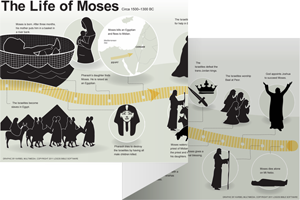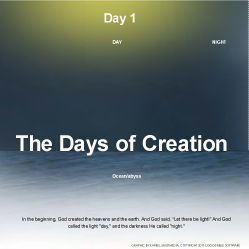90:title–17 Psalm 90—the first psalm in Book Four of the Psalms (see note on 1:1–6)—is a corporate lament psalm (meant for group settings) that emphasizes the frailty of human life. The psalmist compares people to God, and encourages them to follow God and obey His commands. The psalmist begins by focusing on God’s unchanging nature (vv. 1–2), then contrasts God’s nature with the frailty of humanity (vv. 3–12). Finally, the psalmist petitions God to satisfy His people and give them His favor (vv. 13–17). The psalmist aims to call people to recognize God and follow His ways and in this way, the psalm functions as a wisdom psalm. |
90:title A prayer of Moses Psalm 90 is the only psalm affiliated with Moses, possibly suggesting it should be read in view of Israel’s wilderness
possibly suggesting it should be read in view of Israel’s wilderness experience (see the book of Numbers). The wilderness journey was characterized by Israel’s repetitive unfaithfulness and God’s subsequent punishment.
experience (see the book of Numbers). The wilderness journey was characterized by Israel’s repetitive unfaithfulness and God’s subsequent punishment.
the man of God The Hebrew phrase used here, ish-ha'elohim, likely has a prophetic connotation (see Deut 18:15; 34:10). Moses is called eved-yhwh (“the servant of Yahweh”) in Deut 34:5.
90:1–3 Psalm 90 opens by comparing God’s permanence with the frailty of humankind. |
90:2 the mountains Often associated with divine residences or divine visitation in the ancient near East, probably due to their height and their difficult terrain. The psalmist may be demonstrating that God is superior to other deities by emphasizing that He is older than the places where other deities supposedly live.
 Cosmic Garden and Mountain Imagery in the Old Testament
Cosmic Garden and Mountain Imagery in the Old Testament
were born and you brought forth The Hebrew words used here, yalad (“give birth”), and chil (“bring forth”) hold connotations of birth, indicating an element of tension in the creative process. The created world is, in a way, unstable, while God is constant.
90:3 to the dust The Hebrew word used here, dakka (meaning “something crushed”), emphasizes the fragility of people before the Creator. This is not the same word that appears in Gen 2:7 (aphar in Hebrew).
You return This phrase is used here and at the close of the psalm (Psa 90:13) to provide a bookend structure to the psalm.
90:4–6 These verses focus on the human condition in general, describing the fragility of humanity—human life doesn’t last very long (v. 4) and is easily destroyed (vv. 5–6). |
90:4 For a thousand The Hebrew text here includes a marker (compare vv. 7, 9) that creates three segments between the two occurrences of shuv (often translated “return”; see v. 3 and note; v. 13).
are like yesterday when it passes The comparison of days and years emphasizes the fleeting nature of human life (compare vv. 9, 15).
or like a watch in the night The Hebrew word used here, ashmurah, refers to a length of time during the night, when most people are asleep and unaware.
90:5 You sweep them away Emphasizes God’s claims on people. He, not impersonal forces, has the ability to sweep people away. The image of a flood provides an active counterpoint to the passive images of the cycle of time (v. 4) and withering grass (vv. 5–6).
In the morning The newness of the morning fades quickly. Compare v. 14.
90:6 by evening it withers See v. 14.
90:7–8 Verse 5 introduced God’s destructive power, but didn’t describe His motive for sweeping humans away (see v. 5). These verses indicate that God’s anger and judgment upon humanity is a result of human sin. People are not only mortal and fragile, they are also accountable to God and liable to judgment. |
90:7 we are brought to an end God’s anger and subsequent judgment are a response to sin (compare v. 8). Here, divine judgment—not natural aging—is the main component in human mortality (see v. 10 and note).
90:8 iniquities The Hebrew word used here, awon, can refer to misdeeds or the guilt and punishment that come from the misdeeds. God judges because of Israel’s unrepentant sinfulness.
hidden sins into the light of God sees all the deeds of the people, even when they try to conceal them.
90:9–12 This section of the psalm reflects on the realities of life before God. Since people are weak and liable to judgment, they should respond with obedience and submission to God. |
90:9 all of our days Compare v. 15.
your rage God’s wrath is described as ongoing, which reinforces the connection between sin and judgment in v. 8.
90:10 are seventy years or if by strength eighty Describes an average life span; this is the first identification in the psalm of normal human aging being a cause of death (compare vv. 7–8, 9).
is trouble and disaster The psalmist directly relates the difficulty of life to judgment from God.
90:11 the fear due Fearing God means placing all other potential objects of fear or reverence in perspective and revering Him above else. Fearing God can be described as giving Him respect or honor. Verse 12 advocates a response to God’s power and wrath.
 Fearing God in the Old Testament
Fearing God in the Old Testament
90:12 teach us to number our days A response to God’s power and wrath—emphasizing that people should pay attention to God’s ways each day and appreciate the life given to them.
a heart of wisdom Wisdom starts with being properly oriented to God.
90:13–17 This final section presents the foremost element of biblical wisdom: submission to God. Wisdom is expressed in an impassioned plea to God for mercy, not a detached, analytical stance. |
90:13 Return, O Yahweh See v. 3 and note. It is unknown whether the Israelites are asking God to turn divine anger away from them or turn toward them in kindness. God is never absent in Psa 90, but present and angry.
90:14 Satisfy us in the morning In contrast to the withering grass of vv. 5–6, those satisfied by God from the moment they wake can withstand adversity. See v. 5 and note.
with your loyal love Implies that grace or loyal love (chesed), not wrath, reflects God’s character. See note on 25:10.
 Chesed Word Study
Chesed Word Study
all our days In v. 6, the grass is described as withering after a single hot day; in contrast, people whom God helps look forward to long life.
90:15 you have afflicted us See note on v. 4. Indicates that God’s agency in both blessing and afflicting the people is prominent.
90:16 your work Refers to God’s reaction to the previous pleas for compassion, satisfaction, and joy (vv. 13–15).
their children The psalmist wants God’s blessing to extend beyond the present generation to later generations of God’s people. See v. 17 and note.
90:17 establish for us the work of our hands This could refer generally to obedience and faithfulness to God (the wisdom described in Ps 90:12). More specifically, if Moses is the psalmist (see v. title and note), the work described here may be defined by passages like Deut 6:1–15, and describe Israel’s faithfulness to the covenant while in the promised land.

|
About Faithlife Study BibleFaithlife Study Bible (FSB) is your guide to the ancient world of the Old and New Testaments, with study notes and articles that draw from a wide range of academic research. FSB helps you learn how to think about interpretation methods and issues so that you can gain a deeper understanding of the text. |
| Copyright |
Copyright 2012 Logos Bible Software. |
| Support Info | fsb |
 Loading…
Loading…


